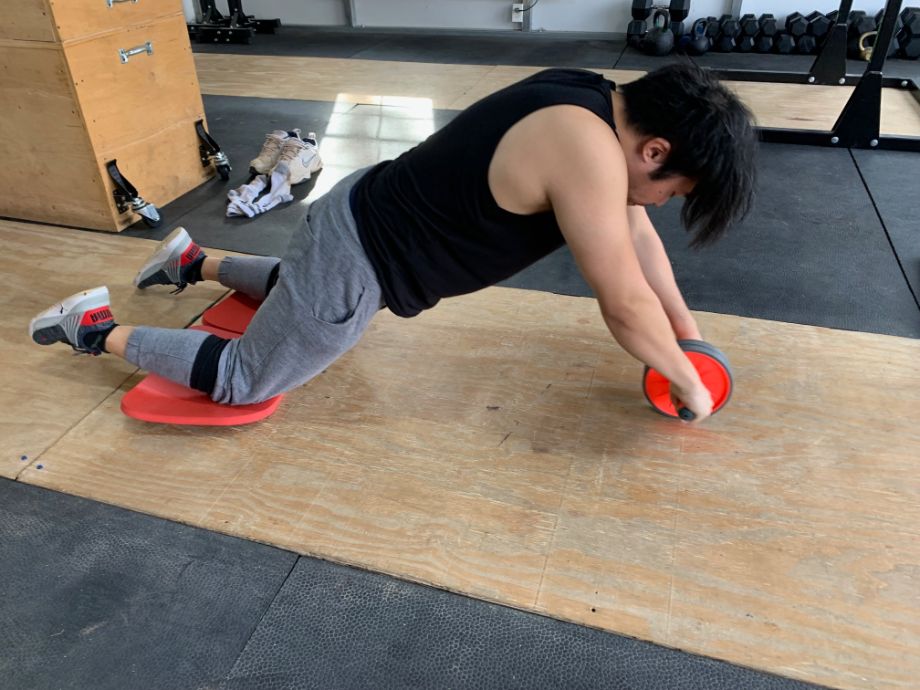We test and review fitness products based on an independent, multi-point methodology. If you use our links to purchase something, we may earn a commission. Read our disclosures.
Strengthening the core is essential for training (and vanity). It better ties the upper and lower body together for better performance and strength. Knowing and understanding the various types of core workouts is necessary to isolate and bring up muscle groups like the upper abs to strengthen weaknesses if they exist.
RELATED: Kettlebell Core Workout
Yes, believe it or not, the upper abs are something you need to focus on in your core training.
To help you sift through all the upper ab workouts out there, we’ll dive into the benefits of upper ab training, how your upper abs muscles function, and provide you with the 11 moves you can use to create the best upper ab workouts.
Medical disclaimer: This article is intended for educational and informational purposes only. It is not intended as a substitute for medical advice. For health advice, contact a licensed healthcare provider.
Anatomy 101: What Are the Upper Abs?
Your core is made up of several muscles, including the obliques, the transverse abdominis, and the rectus abdominis. When people talk about the “upper abs,” however, they’re usually referring to just the upper half of the rectus abdominis, or the six-pack muscles, which run vertically up the front of your abdomen and help with spinal flexion and anti-extension.
Why Target the Upper Abs?
The upper abs play a critical role, with the pelvis, hips, and anterior core working together. Performing upper ab core exercises improve balance, stability, and strength whether you are a weekend warrior or out in the yard.
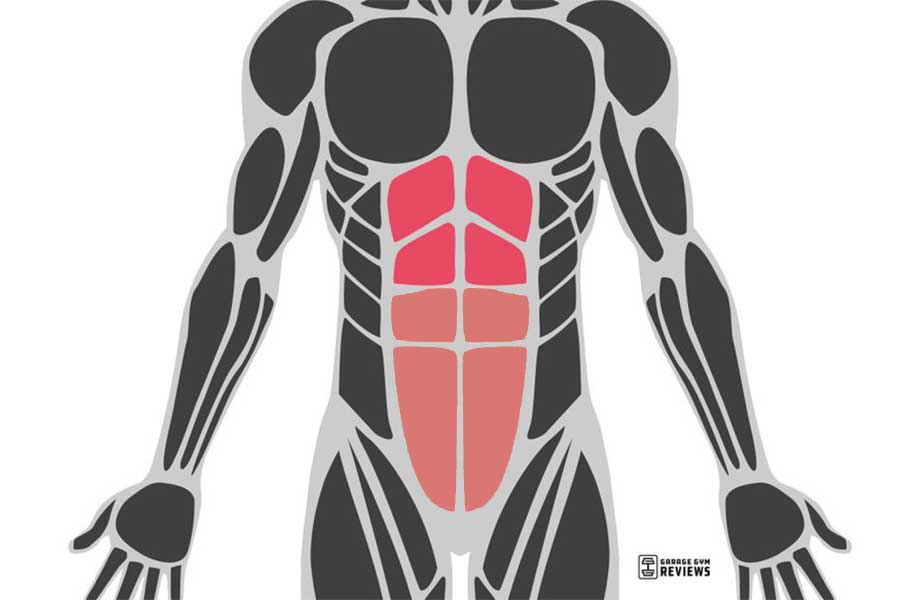
When lifting weights, you put compressive and shearing forces on the spine; having strong upper abs helps keep the spine neutral. Strong upper abs allow you to transfer power from the lower to the upper body without energy leaks, which leads to better movement.
For the person who wants to get stronger or limit their risk of injury, having a more muscular upper core with better endurance allows you to do more work with less pain and fatigue.
11 Best Upper Ab Exercises
Here are the 11 best ab exercises for your core strength training pleasure. Some can be performed at-home with no equipment, and some will need equipment.
- Hollow Hold
- Plank Walkout
- Bicycle Crunch
- Sit-Up
- Ab Rollout
- Weighted Dead Bug
- Hanging Leg Raises
- Strict Toes to Bar
- Dragonfly
- Dumbbell Pullover
- Tall-Kneeling Cable
RELATED: Best Core Exercises Equipment
Equipment Needed
- Barbell or Ab Roller
- Weight Plate
- Pull-Up Bar
- Weight Bench
- Dumbbell
- Cable Machine with a rope attachment
1. Hollow Hold
Why it’s great: The isometric contraction when performing the hollow hold creates a stronger ability to brace. Ab bracing is vital as this helps protect your spine from all you throw at it.
How to do it:
- Lie face up on the floor with your arms extended overhead and your legs straight.
- Press your lower back into the ground and engage your abs while simultaneously lifting your legs and upper body off the floor.
- Hold this position for time.
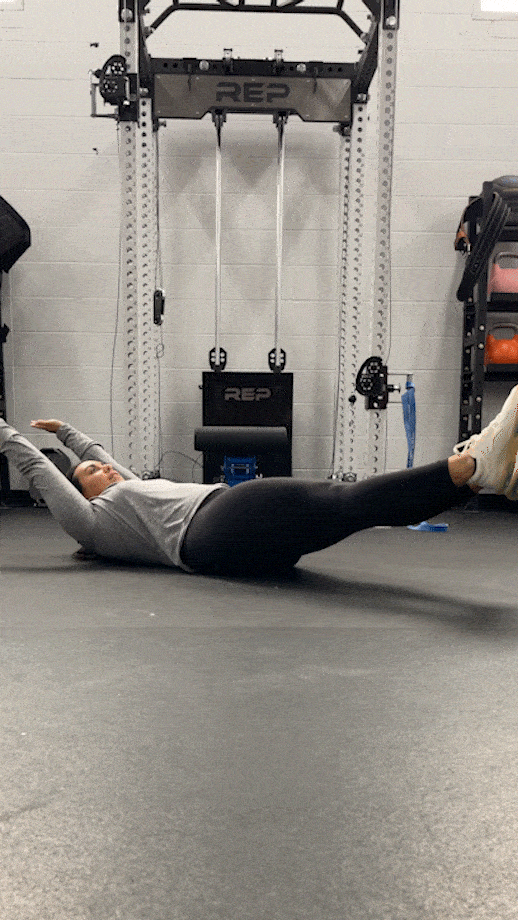
2. Plank Walkout
Why it’s great: Because you’re walking your hands out during the plank walkout, you are training the entire core and upper abs dynamically and strengthening them in the extended position.
How to do it:
- Get in a push-up plank position with your hands underneath your shoulders, glutes engaged, and spine neutral.
- Without letting your hips sag, walk your hands forward as far as you can while maintaining good form.
- When you have reached your stopping point, walk back to the starting position and reset and repeat.
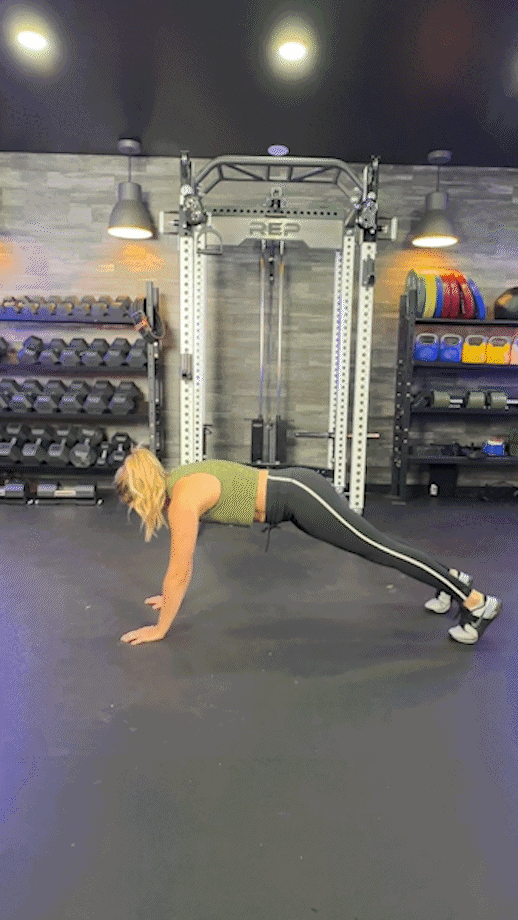
3. Bicycle Crunch
Why it’s great: When performing the bicycle crunch, you bring your elbow to the opposite knee, which trains the hip flexors, upper and lower abs, and obliques. When done quickly, this exercise is almost like performing cardio.
How to do it:
- Lie face up on the ground with both legs extended and your toes pointed at the ceiling.
- Place both hands behind your ears and lightly grip the back of your head.
- Twist to your right side, bringing your right elbow and your left knee toward each other simultaneously. Return to the starting position.
- Twist to your left, bringing your left elbow toward your flexed right leg, then return to the starting position.
- Alternate sides for an even number of repetitions. Your legs should look like they are riding a bike.
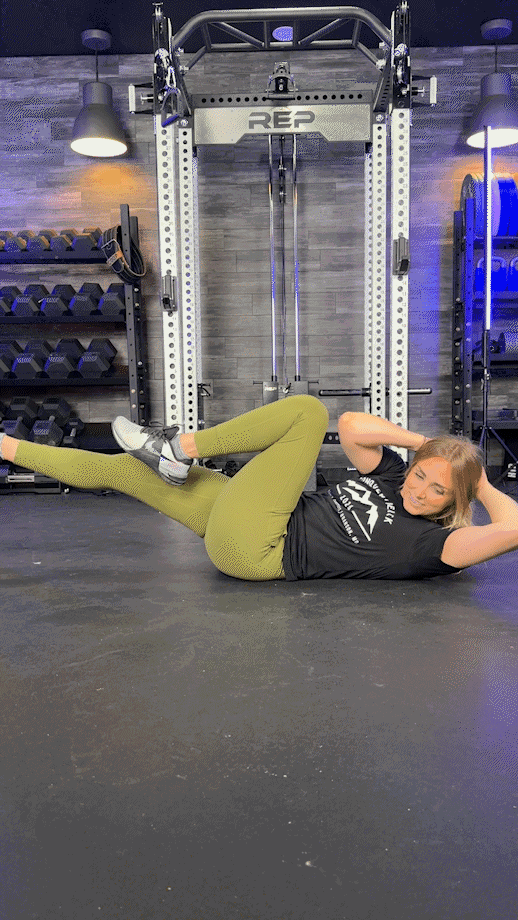
4. Sit-Up
Why it’s great: Sit-ups are a functional move that work your entire core. They can help improve your posture as well as flexibility and range of motion in your spine and hips.
NOTE: The McGill curl-up is a great exercise to train instead of the sit-up if you suffer from lower back pain because it minimizes stress on the lower back while increasing the endurance of the upper abdominals.
How to do it:
- Lie on your back with your knees bent and your feet flat on the ground about hip-width apart. To give you more stability, you can place your feet under a piece of furniture or have a partner hold them down.
- Place your hands behind your head or cross them over your chest, whichever is more comfortable for you.
- Slowly lift your upper body off the ground while keeping your neck neutral and your core engaged.
- When you are fully upright, slowly lower back down to the starting position and repeat.
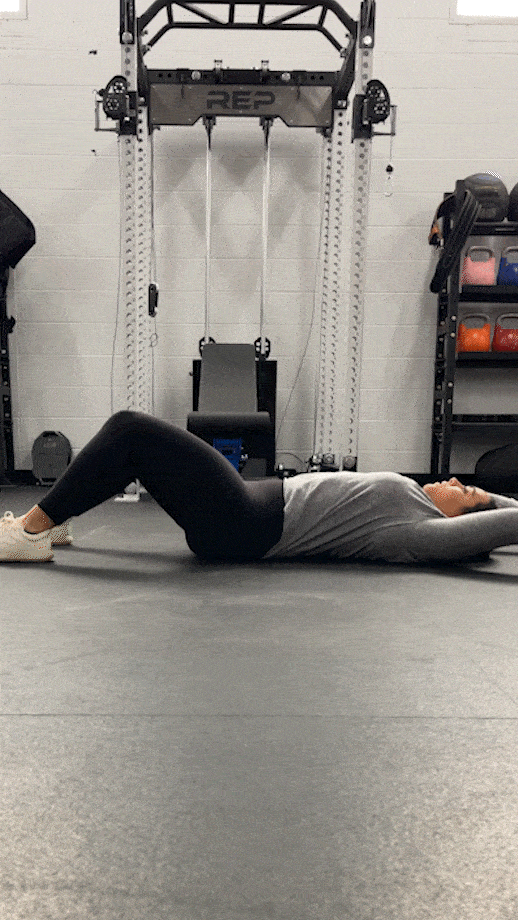
5. Ab Rollout (With a Barbell or Ab Roller)
Why it’s great: The ab rollout will strengthen your upper abs in the extended position and improve your core’s eccentric strength.
How to do it:
- Get on your hands and knees and grip a barbell or ab roller with both hands shoulder-width apart and your hands directly underneath your shoulders.
- Roll the ab wheel forward, keeping your arms straight as you round your upper back and tuck your hips under to straighten your spine.
- Lower your hips and chest toward the ground while contracting your abs to keep your spine neutral. Try not to let your lower back arch too much.
- Squeeze your lats and pull yourself back to the starting position. Reset and repeat.
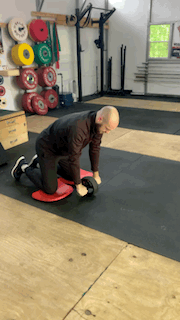
6. Weighted Dead Bug
Why it’s great: When the weighted dead bug is performed with a weight, like a kettlebell or weight plate, this puts extra tension on your upper abs, shoulders, and lats. The weighted dead bug is a fantastic movement for the chest, too.
How to do it:
- Lie on the ground with your legs straight, holding a weight plate or a kettlebell over your chest. Lift your legs off the floor and bend your knees to 90 degrees.
- Ensure your lower back is neutral and take a deep breath before you start.
- Exhale while extending one leg straight out until it is floating just above the floor. The other leg should remain flexed in a 90-degree angle and the weight held steady over your chest. (You can make this move harder by lowering the plate or kettlebell behind you as you extend your leg).
- Return to the starting position and repeat with the opposite leg.
- Keep alternating sides for an even number of repetitions.
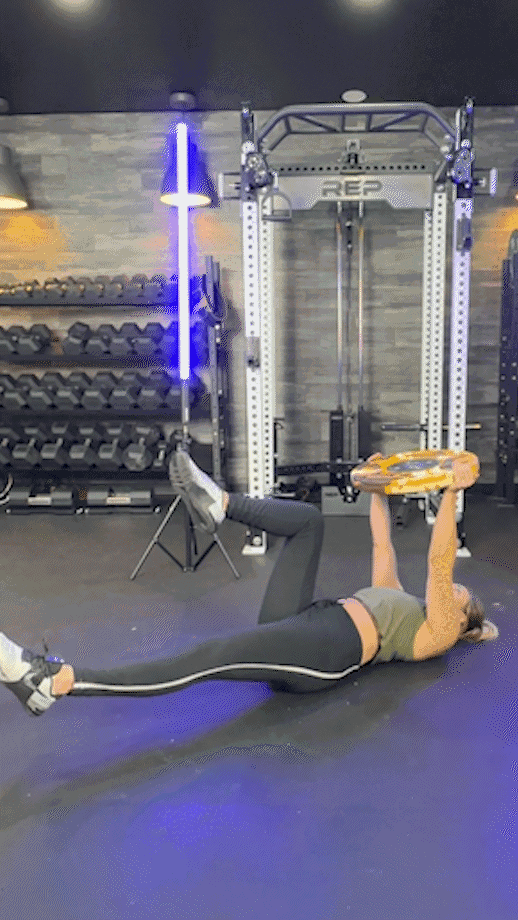
7. Hanging Leg Raises
Why it’s great: Hanging leg raises are a beginner-friendly ab exercise that will target your upper abs and improve your grip strength.
How to do it:
- Hang from a pull-up bar with a slightly wider than shoulder-width grip.
- Pull your shoulder blades together and engage your core as you press lift your knees up toward your chest without using excessive momentum.
- Slowly lower your legs down and reset and repeat.
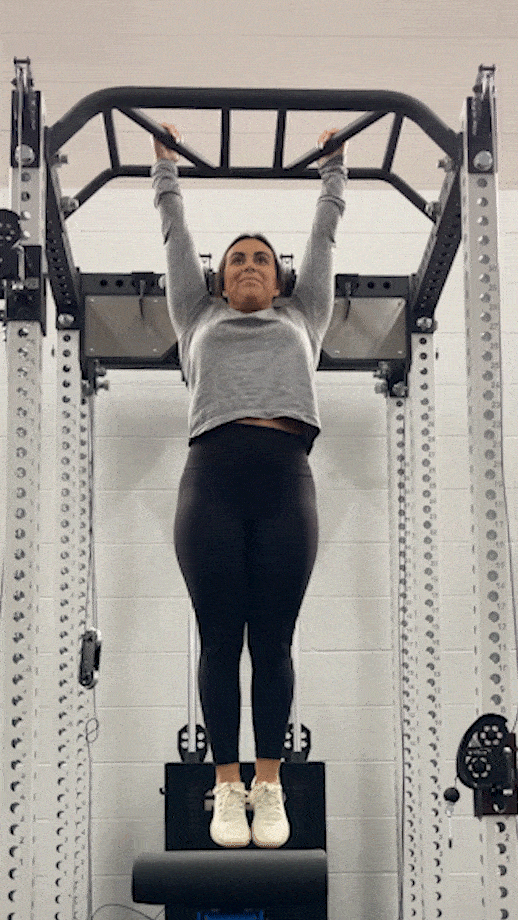
8. Strict Toes to Bar
Why it’s great: Not only will the toes to bar exercise strengthen your shoulders, upper abs, and back, the more extensive range of motion (compared to the hanging leg raise) is excellent for building upper ab muscle.
How to do it:
- Hang from a pull-up bar with a slightly wider than shoulder-width grip.
- Keeping them together and as straight as possible, raise your legs until your toes touch the bar between your hands.
- Slowly lower to the starting position and reset and repeat.
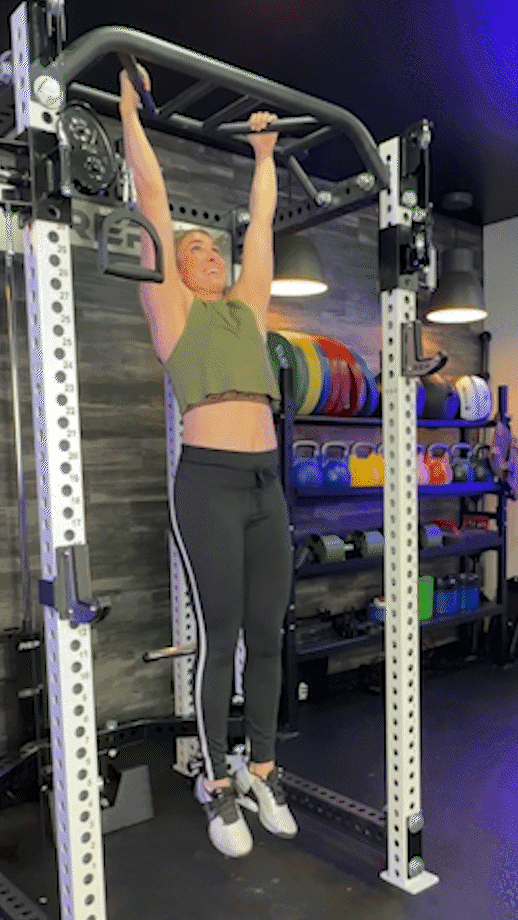
9. Dragonfly
Why it’s great: There is a reason why this exercise was one of Bruce Lee’s favorites. It’s a challenging full-body exercise that crushes the upper abs in a good way.
How to do it:
- Lie flat on your back and hold a squat rack, weight bench, or other sturdy object above your head.
- Contract your core to roll your weight onto your shoulders, lifting your legs straight up over your upper body, keeping your body weight on your shoulders and upper back, until your feet point to the ceiling.
- Slowly lower your legs toward the ground with your core and glutes engaged.
- Pause, return to the starting position, and repeat.
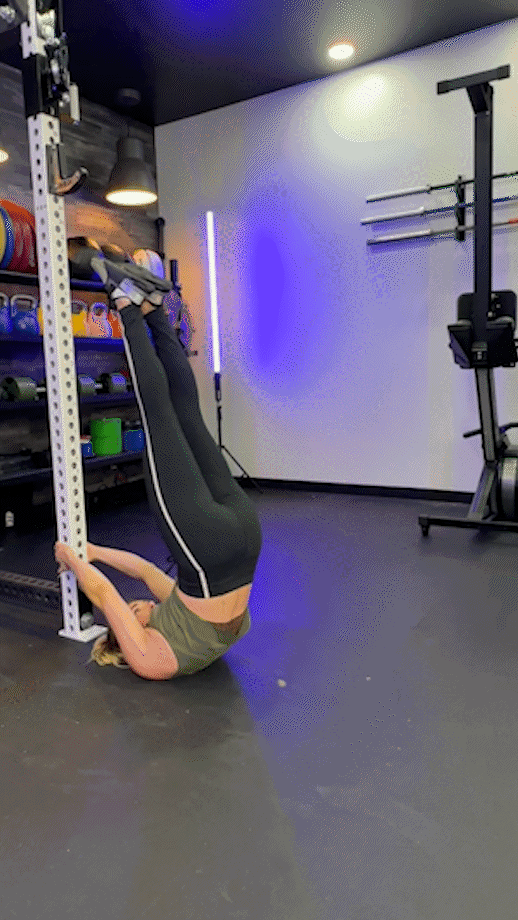
10. Dumbbell Pullover
Why it’s great: The dumbbell pullover is an old-school bodybuilding exercise. This exercise trains the upper ab, chest, lats, and serratus anterior through a large range of motion for increased size and strength. You can make it focus on your core more by performing it with only your shoulders on a weight bench so the rest of your body is forced to stabilize.
RELATED: Best Dumbbells
How to do it:
- Lay face up on a weight bench, holding a dumbbell.
- Press the dumbbell over your chest, then lower your arms behind your head while maintaining a slight bend in your elbows.
- Keep lowering the dumbbell until you feel a stretch in your chest, upper abs, and lats.
- Pull the dumbbell back over your chest, then pause, reset, and repeat.
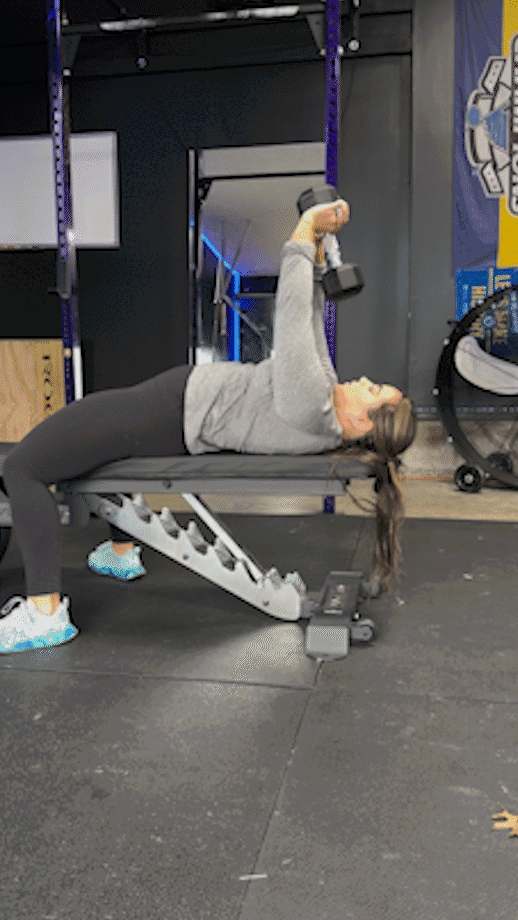
11. Tall-Kneeling Cable Crunch
Why it’s great: Using a cable machine allows you to safely add more weight than other weighted crunch variations. The constant tension from the cable machine allows your upper ab muscles to work harder for better size and strength potential.
How to do it:
- Place a rope handle attachment on a cable machine. Get down on your knees facing the weight stack, then grip the rope with both hands behind your head.
- Crunch forward, bringing your forearms down to your knees and your head almost to the ground.
- Pause, slowly return to the starting position, and repeat for desired reps.
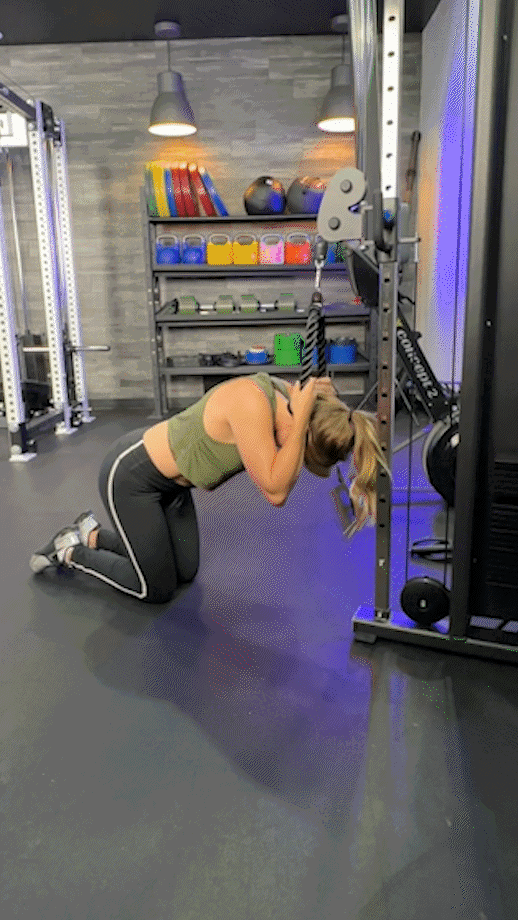
How to Program Upper Ab Exercises Into Your Workout Routine
Upper ab exercises should be done once to twice a week, depending on your physique goals. It’s important to balance this with other ab workouts as well as strength exercises that can help stabilize your core.
FAQs: Upper Ab Workouts
What exercises work your upper abs?
The upper abs are the top portion of your rectus abdominis, or “six-pack” muscles, and the workouts that work your upper abs are spinal flexion movements, like almost all of the 11 exercises on this list. Most hip flexion-based exercises like a leg raise target more of the lower abdominals.
How do I isolate my upper abs?
When isolating your upper abs, it’s crucial to emphasize lifting the lower body by contracting the abdominals and not using momentum. A good example is the dragonfly exercise.
How do you work your upper abs with weights?
There are a couple of examples of working your upper abs with load, like the weighted dead bug and dumbbell pullover exercises on this list. You can add weight to bodyweight exercises like the strict toes to bar by holding a medicine ball between your legs. The load will further cause activation of the upper abs and help you create a strong core.
Is it easier to build upper abs than lower abs?
Yes, it is easier to build the upper abs than the lower abdominal muscles because most well known exercises target them. They are the first part of your ab muscles revealed when you’re in a caloric deficit when trying to lose belly fat.
Further reading

After researching and using nearly 30 trap bars, we've determined that there is still much to be desired in a trap bar we'd recommend for most people. Despite this, currently, for 2021, our Top Pick for the best trap/hex bar is the Rogue TB-1 Trap Bar. It offers the best value among the trap bars currently on the market, although there's still much room for improvement. This said, many would be just fine choosing one of our more budget-friendly recommendations. Read more

Is this strength and conditioning certification right for you? Depending on your career goals, the PES Certification might be the next athletic performance cert for you. Read more

Dig into the do’s and don’ts of cross-training for runners as well as check out some suggested exercises. Read more

Looking for a snack that won't derail your fitness goals? Check out our list of the best protein bars for weight loss. Read more

